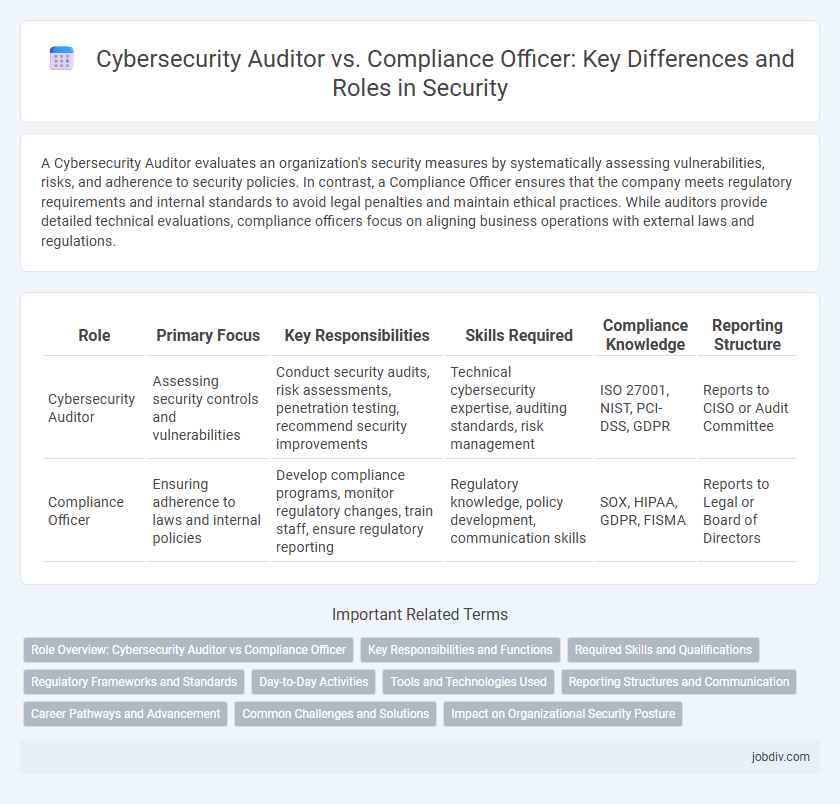A Cybersecurity Auditor evaluates an organization's security measures by systematically assessing vulnerabilities, risks, and adherence to security policies. In contrast, a Compliance Officer ensures that the company meets regulatory requirements and internal standards to avoid legal penalties and maintain ethical practices. While auditors provide detailed technical evaluations, compliance officers focus on aligning business operations with external laws and regulations.
Table of Comparison
| Role | Primary Focus | Key Responsibilities | Skills Required | Compliance Knowledge | Reporting Structure |
|---|---|---|---|---|---|
| Cybersecurity Auditor | Assessing security controls and vulnerabilities | Conduct security audits, risk assessments, penetration testing, recommend security improvements | Technical cybersecurity expertise, auditing standards, risk management | ISO 27001, NIST, PCI-DSS, GDPR | Reports to CISO or Audit Committee |
| Compliance Officer | Ensuring adherence to laws and internal policies | Develop compliance programs, monitor regulatory changes, train staff, ensure regulatory reporting | Regulatory knowledge, policy development, communication skills | SOX, HIPAA, GDPR, FISMA | Reports to Legal or Board of Directors |
Role Overview: Cybersecurity Auditor vs Compliance Officer
A Cybersecurity Auditor evaluates an organization's information systems, policies, and practices to identify vulnerabilities and ensure effective security controls are in place. A Compliance Officer oversees adherence to regulatory requirements, internal policies, and industry standards, ensuring the organization meets legal and ethical obligations. Both roles collaborate to safeguard data integrity, but the auditor focuses on assessing security effectiveness while the compliance officer drives policy enforcement and risk management.
Key Responsibilities and Functions
Cybersecurity Auditors conduct thorough assessments of IT systems and security controls to identify vulnerabilities and ensure adherence to cybersecurity policies, standards, and regulations. Compliance Officers focus on developing, implementing, and monitoring organizational policies and procedures to ensure full compliance with industry regulations such as GDPR, HIPAA, or PCI-DSS. Both roles collaborate to mitigate risks, with auditors providing independent evaluations while compliance officers manage continuous regulatory alignment and training programs.
Required Skills and Qualifications
Cybersecurity auditors require expertise in risk assessment, vulnerability analysis, and familiarity with security frameworks such as NIST, ISO 27001, and CIS controls, combined with certifications like CISA or CISSP. Compliance officers need a strong understanding of regulatory requirements including GDPR, HIPAA, and SOX, along with skills in policy development, internal audits, and communication to ensure organizational adherence to laws and standards. Both roles demand analytical skills, attention to detail, and proficiency in security tools, but cybersecurity auditors emphasize technical security controls, while compliance officers focus on legal and regulatory alignment.
Regulatory Frameworks and Standards
Cybersecurity auditors assess an organization's adherence to regulatory frameworks and standards such as NIST, ISO 27001, and GDPR by conducting thorough security evaluations and identifying vulnerabilities. Compliance officers ensure ongoing conformity with these regulations by developing policies, training staff, and managing risk mitigation strategies aligned with frameworks like HIPAA and PCI DSS. Both roles play critical parts in maintaining regulatory compliance, but auditors focus on verification and reporting while compliance officers emphasize implementation and continuous oversight.
Day-to-Day Activities
A Cybersecurity Auditor conducts regular evaluations of an organization's IT infrastructure, identifying vulnerabilities and verifying adherence to security protocols through penetration testing and risk assessments. A Compliance Officer monitors and ensures that security policies align with regulatory requirements such as GDPR, HIPAA, or PCI-DSS, managing documentation and employee training programs. While auditors focus on technical controls and system effectiveness, compliance officers emphasize policy enforcement and regulatory reporting to maintain organizational security standards.
Tools and Technologies Used
Cybersecurity auditors primarily employ vulnerability assessment tools, penetration testing software, and security information and event management (SIEM) systems to identify and analyze security weaknesses. Compliance officers utilize governance, risk, and compliance (GRC) platforms alongside automated regulatory reporting tools to ensure adherence to industry standards and legal requirements. Both roles leverage data analytics and monitoring technologies, but their toolsets differ based on the focus on technical security evaluation versus regulatory compliance management.
Reporting Structures and Communication
Cybersecurity Auditors typically report to IT or Risk Management departments, focusing on verifying adherence to security policies and identifying vulnerabilities through detailed technical assessments. Compliance Officers primarily report to senior management or the legal department, ensuring organizational alignment with regulatory requirements and facilitating cross-departmental communication on compliance matters. Effective communication between both roles is essential for integrating audit findings into compliance strategies, enhancing overall security governance.
Career Pathways and Advancement
Cybersecurity auditors specialize in evaluating and testing security measures to identify vulnerabilities and ensure regulatory compliance, often advancing into roles such as security consultants or risk managers. Compliance officers focus on developing and enforcing policies to meet legal and industry standards, with career progression typically leading to senior compliance manager or chief compliance officer positions. Both pathways benefit from certifications like Certified Information Systems Auditor (CISA) for auditors and Certified Regulatory Compliance Manager (CRCM) for compliance officers, enhancing prospects for leadership roles in cybersecurity governance.
Common Challenges and Solutions
Cybersecurity auditors and compliance officers often face challenges such as aligning security controls with evolving regulatory requirements and identifying gaps in risk management frameworks. Both roles struggle with integrating complex compliance standards like GDPR, HIPAA, and NIST into practical, actionable policies that safeguard organizational assets. Effective solutions include implementing continuous monitoring tools, fostering cross-departmental collaboration, and utilizing automated compliance software to enhance accuracy and reduce manual errors.
Impact on Organizational Security Posture
A Cybersecurity Auditor systematically evaluates an organization's security controls, identifying vulnerabilities and ensuring the effectiveness of protective measures, which directly strengthens the organization's security posture. A Compliance Officer focuses on aligning business operations with regulatory requirements and industry standards, mitigating legal and compliance risks that could indirectly affect security. Together, their roles ensure a robust, compliant security framework that reduces exposure to cyber threats and regulatory penalties.
Cybersecurity Auditor vs Compliance Officer Infographic

 jobdiv.com
jobdiv.com